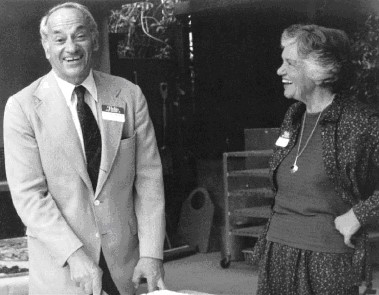Self-Control is Loving Your Future and Yourself:
The importance of learning to control and postpone gratification by imitation and insight
by
Dr. Gorter et al.
Robert Gorter, MD, PhD, is emeritus professor of the University of California San Francisco Medical School (UCSF)
The same part of the brain that allows us to step into the shoes of others (both as empathy and as imitation, the basis of learning at early age and on which the fashion industry is built) also helps us restrain ourselves.
You’ve likely seen the video before: a stream of kids, confronted with a single, alluring marshmallow. If they can resist eating it for 15 minutes, they will get two. Some do. Others cave in for the temptation almost immediately.

Over the last 50+ years, the “Marshmallow Test” has become synonymous with temptation, willpower, and grit. Walter Mischel’s work permeates popular culture.
Delay of gratification, the act of resisting an impulse to take an immediately available reward in the hope of obtaining a more-valued reward in the future. The ability to delay (control) gratification is essential to self-regulation, or self-control: to inner development.
Delay of gratification, the act of resisting an impulse to take an immediately available reward in the hope of obtaining a more-valued reward in the future. The ability to delay gratification is essential to self-regulation and or self-control.
To study the conditions that promote delay of gratification, the American psychologist Walter Mischel and his colleagues designed an experimental situation (“the marshmallow test”) in which a child is asked to choose between a larger treat, such as two cookies or marshmallows, and a smaller treat, such as one cookie or marshmallow. After stating a preference for the larger treat, the child learns that to obtain that treat, it is necessary to wait for the experimenter to return. The child is also told that if he or she signals the experimenter, the experimenter will return and the child will receive the smaller treat. Thus, the smaller treat is available now, but the larger treat requires waiting. To get the larger treat, the child must resist the temptation to get an immediate treat.
That experimental situation has proven very useful both in demonstrating the importance of the ability to delay gratification and in identifying strategies that make it possible for children to delay gratification. Children who were best able to wait in that situation when they were four years old are more socially and academically successful as high-school students and earn higher Scholastic Aptitude Test (SAT) scores. The situation, adapted for adolescents and teens by the psychologist Edelgard Wulfert and her colleagues, also revealed that middle- and high-school students who can wait a week for a monetary reward earn higher grades, show less problem behavior in school, and are less likely to use cigarettes, alcohol, and other drugs than their peers who choose not to wait.

Walter Mischel (*1930 in Vienna, Austria) is a world-renowned psychologist specializing in personality theory and social psychology. A Review of General Psychology survey, published in 2002, ranked Mischel as the 25th most cited psychologist of the 20th century
This “Marshmallow Test,” first conducted in the 1960s, perfectly illustrates the ongoing war between impulsivity and self-control. The kids have to tamp down their immediate desires and focus on long-term goals—an ability that correlates with their later health, wealth, and academic success, and that is supposedly controlled by the front part of the brain. But a new study by Alexander Soutschek at the University of Zurich suggests that self-control is also influenced by another brain region—and one that casts this ability in a different light.
Neurobiological models of self-control predominantly focus on the role of prefrontal brain mechanisms involved in emotion regulation and impulse control. New evidence for an entirely different neural mechanism that promotes self-control by overcoming bias for the present self, have been documented. This is a mechanism previously thought to be mainly important for interpersonal decision-making. In two separate studies, we show that disruptive transcranial magnetic stimulation (TMS) of the temporo-parietal junction—a brain region involved in overcoming one’s self-centered perspective—increases the discounting of delayed and prosocial rewards. This effect of TMS on temporal and social discounting is accompanied by deficits in perspective-taking and does not reflect altered spatial reorienting and number recognition. Our findings substantiate a fundamental commonality between the domains of self-control and social decision-making and highlight a novel aspect of the neurocognitive processes involved in self-control

Alexander Soutschek, PhD, University of Zurich, Switzerland
Press your right index finger to the top of your right ear, where it meets your head. Now move up an inch and back an inch. You’re now pointing at your right temporoparietal junction (rTPJ). This area has long been linked to empathy and selflessness. But Soutschek, by using magnetic fields to briefly shut down the rTPJ, has shown that it’s also involved in self-control.
And this makes perfect sense. Empathy depends on your ability to overcome your own perspective, appreciate someone else’s, and step into their shoes. Self-control is essentially the same skill, except that those other shoes belong to your future self—a removed and hypothetical entity who might as well be a different person. So think of self-control as a kind of temporal selflessness. It is that presently you taking a hit to help out your “Future You.”
For a long time, people have speculated that one uses the same mechanisms to reason about other people as about one’s own hypothetical self and these data generated by Soutschek study fits really well.”
Saxe should know. She was one of the first scientists to link the rTPJ to theory of mind—the ability to understand the mental states of other people. In 2005, she and Nancy Kanwisher scanned people’s brains while they listened to stories in which protagonists made poor choices based on false beliefs. This experiment showed that the TPJ is active specifically when people are “reasoning about the contents of another person’s minds”—the essence of theory of mind. This region, the duo wrote, helps people to think about thinking people.
At the same time, many other neuroscientists were doing similar experiments and getting the same answers. The consensus was striking, Saxe later wrote. “Because there was almost no pre-existing neuroscience of theory of mind, researchers came to the topic with unusually few preconceptions about where to look in the brain. In those circumstances, neuroimaging is notoriously fickle, producing many false positives and false negatives. Yet every group that sought to identify brain regions implicated in ToM got essentially the same answer; and in study after study, we still do.”
Many other studies have since expanded on those early results. If the rTPJ is bigger, people are more likely to behave altruistically. If the neurons within it are better-connected (and well-linked to other parts of the brain), people show less bias towards their own in-groups. If the area is stimulated by electric currents, people become better at taking someone else’s perspective.
And if the region is disrupted, it changes our ability to reason about morality. Consider a woman who poisons her friend’s coffee—if she does so deliberately, we’d judge her more harshly than if she acted accidentally. Intent matters, and we need the rTPJ to judge intent. When Liane Young, one of Saxe’s former students, disrupted the rTPJ using magnetic fields, she found that people were more lenient towards the deliberate poisoner, as long as her friend survived. With their ability to gauge intent disrupted, they started looking to outcomes instead.
Not everything fits with the idea of the rTPJ as a nexus for theory of mind. For example, many studies suggest that it affects our ability to shift our attention from one part of space to another, like a technician moving a spotlight around. “Even in my own small lab, people disagree about the function of the rTPJ,” says Young, now a professor at Boston College.
If you look at the debate and relax your eyes, you can probably merge the two viewpoints into one. Maybe the rTPJ is a region that redirects our attention from one thing to another—whether between objects in the world around us, or between our minds and other people’s. Alternatively, it’s likely that what we call the rTPJ is not actually a singular bit of the brain. “There’s a lot of work suggesting that there are different sub-regions—one of which does spatial reorienting, and the other does perspective-taking,” says Young.
That’s where Soutschek’s study comes in. He specifically focused on the back half of the rTPJ—the one that’s been more heavily linked to empathy—and disrupted it in 43 volunteers. When that happened, the recruits became more likely to pocket a pile of cash for themselves rather than splitting it with a partner, and especially when the partner was a stranger. But they were also more likely to pick a small immediate lump of cash over a larger future one, especially when the delays were long.
A second experiment explained why. This time, the volunteers saw a picture of a man standing in a room with red discs on the wall. The volunteers could see all the discs, but they had to say how many the man in the room could see. They had to shift their perspective to his, and they became worse at that when their rTPJ was disrupted. What’s more, Soutschek showed that the extent of their bias—their inability to leave their own heads—predicted both how impulsive and how selfish they were in the earlier experiment.
This tells us that impulsivity and selfishness are just two halves of the same coin, as are their opposite’s restraint and empathy. Perhaps this is why people who show dark traits like psychopathy and sadism score low on empathy but high on impulsivity. Perhaps it’s why impulsivity correlates with slips among recovering addicts, while empathy correlates with longer bouts of abstinence. These qualities represent our successes and failures at escaping our own egocentric bubbles, and understanding the lives of others—even when those others wear our own older faces.
Delay can be a motivational tendency

Jack Block Jacob “Jack” Block (1924-2010)
Jacob “Jack” Block (1924-2010) was a psychology professor at UC Berkeley. His main areas of research were personality theory, personality development, research methodology, personality assessment, longitudinal research, and cognition. He often collaborated with his wife Jeanne Block.

Jack and his wife Jeanne Block
His most renowned body of work, undertaken primarily with his wife, was a longitudinal study on a cohort of more than 100 San Francisco Bay Area toddlers. He studied them regularly for nearly 30 years. Unlike most longitudinal studies, the Blocks’ focused on the psychological makeup and history of the subjects, rather than quantitative measures such as IQ. The study tracked how the subjects’ background influenced their later choices and the outcomes of their lives.
Block was born in Brooklyn, New York, and received a bachelor’s degree from Brooklyn College. He earned his Ph.D. from Stanford University in 1950. He received many awards over the years and was a fellow of the American Association for the Advancement of Science.
One of Block’s studies drew particular notice in the news media. Published in The Journal of Research in Personality in 2006, it found that subjects who at 3 years old had seemed thin-skinned, rigid, inhibited and vulnerable tended at 23 to be political conservatives. On the other hand, 3-year-olds characterized as self-reliant, energetic, somewhat dominating and resilient were inclined to become liberals.
Rather than conceptualizing delay of gratification as a distinct ability, the American psychologists Jack Block and David Funder and their colleagues identified it as an expression of ego control—a person’s more-general tendency to inhibit impulses. On the low end of that continuum are the under-controlled individuals who spontaneously act on their wants, without concern about the future or about others. On the high end are the over-controlled individuals who restrain themselves even when it is not necessary to do so. Both under-control and over-control are maladaptive. Under-controlled individuals are unable to work toward long-term goals, such as pursuing a challenging career path. Over-controlled individuals miss opportunities to experience pleasure and express feelings.

David Funder
David C. Funder is a psychology professor who has written a number of important textbooks and research articles pertaining to the field of personality psychology. Funder resides as the chair of the Psychology department at the University of California, Riverside. He used to be a past editor of the Journal of Research and Personality, as well as being a former secondary editor of the Journal of Personality and Social Psychology. Funder has been praised for his studies on personality judgment. He had also published research over the attribution theory and the “delay of gratification”.
To measure the tendency to delay, those researchers developed an experimental situation in which children are shown an attractively wrapped present and told that it is for them but that it will be set aside while they work on a puzzle. Delay of gratification is measured by the degree to which the children resist attending to and opening the gift. Because it is clear to the children that they will receive the gift regardless of their behavior, delaying behavior in that situation is not necessarily adaptive.
The darker side of one’s personality
Though relationships between empathy, impulsivity, and personality traits making up the Dark Tetrad of personality have been studied individually, the relationship of empathy and impulsivity to the Dark Tetrad of personality simultaneously has not been studied.

Ashlee Justice is a psychologist at Oceans Behavioral Hospital, Abilene Christian University, USA
Ashlee Justice studied the relationship of both empathy and impulsivity to the Dark Tetrad simultaneously, and assessed specific combinations of traits, empathy, and impulsivity. Participants from a private university completed online surveys. Correlations and predictions of variables were examined. Individuals who rated high on Machiavellianism, psychopathy, and sadism had significantly lower scores on empathy subscales, and individuals rating high on these as well as narcissism had significantly high scores on impulsivity subscales. Results also indicated that psychopathy and sadism both predicted lack of empathy, while only sadism significantly predicted poor impulse control. Surprisingly, narcissism was positively correlated with, and predictive of empathy. Overall, it was found that the combination of psychopathy and sadism simultaneously could result in particularly dangerous outcomes.

Conclusion:
Several studies have shown that a child’s ability to delay eating the first treat predicted higher SAT scores and a lower body mass index (BMI) 30 years after their initial Marshmallow Test. Researchers discovered that parents of “high delayers” even reported that they were more competent than “instant gratifiers”—without ever knowing whether their child had gobbled the first marshmallow or not.
To (learn to) be able to delay instant gratification is one of the most significant qualities for inner development and success in life.